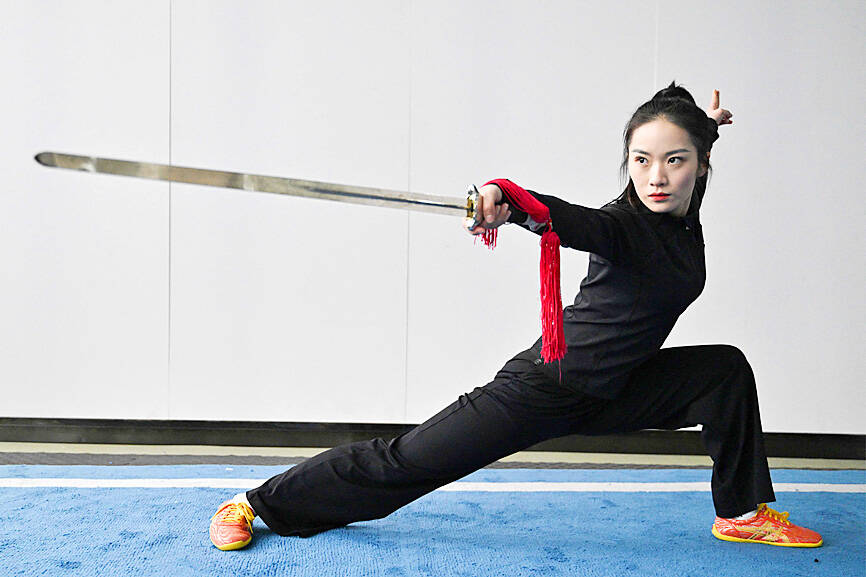In front of a secluded temple in southwestern China, Duan Ruru skillfully executes a series of chops and strikes, practicing kung fu techniques she has spent a decade mastering.
Chinese martial arts have long been considered a male-dominated sphere, but a cohort of Generation Z women like Duan is challenging that assumption and generating publicity for their particular school of kung fu.
“Since I was little, I’ve had a love for martial arts... I thought that girls learning martial arts was super swaggy,” Duan, 23, said.

Photo: AFP
The ancient Emei school where she trains in the mountains of China’s Sichuan Province is thought to have historically welcomed a higher proportion of women and girls, but it has not achieved the same level of public fame as other kung fu schools, such as Shaolin.
That is starting to change thanks in part to Duan’s nine-woman troupe, Emei Kung Fu Girls, which meshes deft sword work with social media savvy to help put the sect back on the map.
In slick videos, the troupe performs everything from combat scenes to flips in front of the Louvre in Paris, often backed by booming hip-hop beats.
They also show off their moves alongside branded beverages or cars, though the group declined to comment on whether they make money from advertising.
Since their debut in April last year, they have amassed more than 23 million views and over 1 million followers on Douyin, China’s version of TikTok.
The artform “has a place in history ... so I think it’s something worth spreading,” Duan said.
Known across China for its misty peaks, Emeishan in Sichuan has tried over the past few years to cash in on its cultural bounty — with mixed results.
Local martial arts sects have their origins in ancient Taoist philosophy and evolved into a form of defense during China’s frequent wars.
The importance of the schools shrank as weapons modernized, and the ruling Chinese Communist Party later suppressed what it viewed as potential hotbeds of deviant thought.
However, those policies have since relaxed, and in 2008 Beijing listed Emei martial arts as intangible cultural heritage, opening up funds to develop the craft.
Progress has been uneven, with city officials admitting in 2023 that the discipline suffered from “a lack of recognition among tourists, and dissemination is not high.”
Kung fu master Wang Chao, a national-level representative of Emei martial arts, said the sect still relies heavily on government money.
However, the Kung Fu Girls’ videos have been “very good” at bringing the local art to a wider audience, he said.
“Publicity for Emei martial arts is much more powerful now,” he said.
Founding member Duan, who has been training since she was 12 years old, said her generation “loves being independent and free-spirited.”
Some Emei students have been inspired to keep pursuing martial arts, including Ren Nianjie, who wants to study it at university.
“I want to be an athlete ... to win glory for the country,” the 17-year-old said after whirling a wooden staff.
The popular image of Emei’s female fighters comes largely from best-selling novels by Hong Kong author Louis Cha (查良鏞), who wrote under the pen name Jin Yong (金庸).
In reality, boys still outnumber girls — but perhaps not as heavily as in other sects.
On a Friday evening last month, seven girls were present among a class of 17 elementary-school students at a nearby martial arts academy.
Parent Zhu Haiyan, 41, said her daughter Guoguo had grown more assured since starting her course a year ago.
“When girls have self-confidence, they can be less timid when they go out,” she said as Guoguo practiced on a mat a few meters away.
Duan said she hoped her group would inspire more young girls to take up martial arts.
“They might see me training and think it’s super attractive and cool, and be drawn to learn it themselves,” she said.

MONEY GRAB: People were rushing to collect bills scattered on the ground after the plane transporting money crashed, which an official said hindered rescue efforts A cargo plane carrying money on Friday crashed near Bolivia’s capital, damaging about a dozen vehicles on highway, scattering bills on the ground and leaving at least 15 people dead and others injured, an official said. Bolivian Minister of Defense Marcelo Salinas said the Hercules C-130 plane was transporting newly printed Bolivian currency when it “landed and veered off the runway” at an airport in El Alto, a city adjacent to La Paz, before ending up in a nearby field. Firefighters managed to put out the flames that engulfed the aircraft. Fire chief Pavel Tovar said at least 15 people died, but

LIKE FATHER, LIKE DAUGHTER: By showing Ju-ae’s ability to handle a weapon, the photos ‘suggest she is indeed receiving training as a successor,’ an academic said North Korea on Saturday released a rare image of leader Kim Jong-un’s teenage daughter firing a rifle at a shooting range, adding to speculation that she is being groomed as his successor. Kim’s daughter, Ju-ae, has long been seen as the next in line to rule the secretive, nuclear-armed state, and took part in a string of recent high-profile outings, including last week’s military parade marking the closing stages of North Korea’s key party congress. Pyongyang’s official Korean Central News Agency (KCNA) released a photo of Ju-ae shooting a rifle at an outdoor shooting range, peering through a rifle scope

South Korea would soon no longer be one of the few countries where Google Maps does not work properly, after its security-conscious government reversed a two-decade stance to approve the export of high-precision map data to overseas servers. The approval was made “on the condition that strict security requirements are met,” the South Korean Ministry of Land, Infrastructure and Transport said. Those conditions include blurring military and other sensitive security-related facilities, as well as restricting longitude and latitude coordinates for South Korean territory on products such as Google Maps and Google Earth, it said. The decision is expected to hurt Naver and Kakao

Gaza is rapidly running out of its limited fuel supply and stocks of food staples might become tight, officials said, after Israel blocked the entry of fuel and goods into the war-shattered territory, citing fighting with Iran. The Israeli military closed all Gaza border crossings on Saturday after announcing airstrikes on Iran carried out jointly with the US. Israeli authorities late on Monday night said that they would reopen the Kerem Shalom crossing from Israel to Gaza yesterday, for “gradual entry of humanitarian aid” into the strip, without saying how much. Israeli authorities previously said the crossings could not be operated safely during